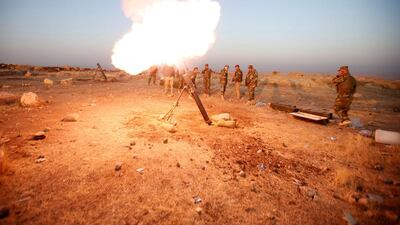ERBIL // Kurdish peshmerga fighters backed by Turkish artillery said they had captured the ISIL-held town of Bashiqa on Sunday, marking Turkey’s first major involvement in the Mosul offensive.
Masoud Barzani, the president of Iraq’s autonomous Kurdish region, told visiting US defence secretary Ash Carter that the Kurds had succeeded in liberating Bashiqa, an American official said.
It came after peshmerga forces launched a dawn offensive on two fronts near Bashiqa, which lies 12 kilometres north-east of ISIL-held Mosul.
Major General Haider Fadhil, of Iraq’s special forces, however, said the peshmerga had surrounded Bashiqa but only seized parts of the town. He also said the Kurds had captured two villages near Bashiqa and a small Shiite shrine in the area.
Bashiqa’s capture, if confirmed, would mark the removal of one more obstacle on the road to the northern Iraqi city.
Turkey’s prime minister, Binali Yildirim, said Turkish artillery had hit ISIL positions in Bashiqa after the peshmerga asked for Ankara’s support.
The claim came a day after Baghdad turned down a suggestion by Mr Carter for Turkey to be given a part in the battle.
Ankara has several hundred troops stationed at a military base near Bashiqa, where they have been helping to train peshmerga and Sunni fighters.
The Iraqi offensive launched on Monday to capture Mosul involves 30,000 Iraqi fighters backed by the US-led anti-ISIL coalition. US special forces are working with Iraqi fighters on the ground, while US, French and British aircraft are providing cover from the skies.
In the past few days ISIL has staged attacks apparently aimed at distracting the advancing forces. The extremists launched a surprise assault on Kurdish-controlled Kirkuk on Friday, with security forces still tracking down fighters involved in the attack on Sunday.
The dozens of attackers, including several suicide bombers, failed to seize control of key government buildings but sowed chaos in the northern city.
At least 51 of the extremists had been killed, including three more on Sunday, local security officials said.
At least 46 people, most of them members of the security forces, were also killed in the raid and ensuing clashes, which had almost completely stopped by Sunday evening.
Life was returning to normal in some parts of the city but security forces were deployed in southern neighbourhoods where several gunmen were still actively being hunted.
On Sunday the group also attacked Rutba, a remote town near the Jordanian border in the western province of Anbar, the area’s top army commander said.
The extremists attacked with five suicide car bombs and briefly seized the mayor’s office but security forces quickly regained the upper hand, the commander said.
The mayor, Imad Al Dulaimi, said the insurgents attacked during the night and gained entry to the town by coordinating with sleeper cells there. About 30 insurgents skirmished with tribal fighters and security forces before vanishing.
At least seven policemen were killed in the assault, according to a police source.
In a further attempt to repel the offensive, ISIL fighters also set fire to a sulphur plant near Mosul. Up to 1,000 people were treated in hospital after inhaling toxic fumes.
Coalition officials have said the offensive is going well, but that it will take a long time to recapture Mosul, which has a civilian population of 1.5 million.
Between 4,000 and 8,000 Islamic State fighters have rigged the city with explosives, built oil-filled moats, dug tunnels, and trenches and are feared to be ready to use civilians as human shields.
Mr Carter sounded optimistic about the campaign during a trip to Erbil, the capital of the Iraqi Kurdish region, as he praised the peshmerga.
“I’m here to commend you and your forces. I’m encouraged by what I see,” he told president Barzani.
Peshmerga spokesman Brigadier General Halgord Hekmet said 25 Kurdish forces had been killed so far.
Mr Carter lamented the casualties but extolled the region’s forces as “exceptionally capable and essential”.
* Reuters, Associated Press, Agence France-Presse

